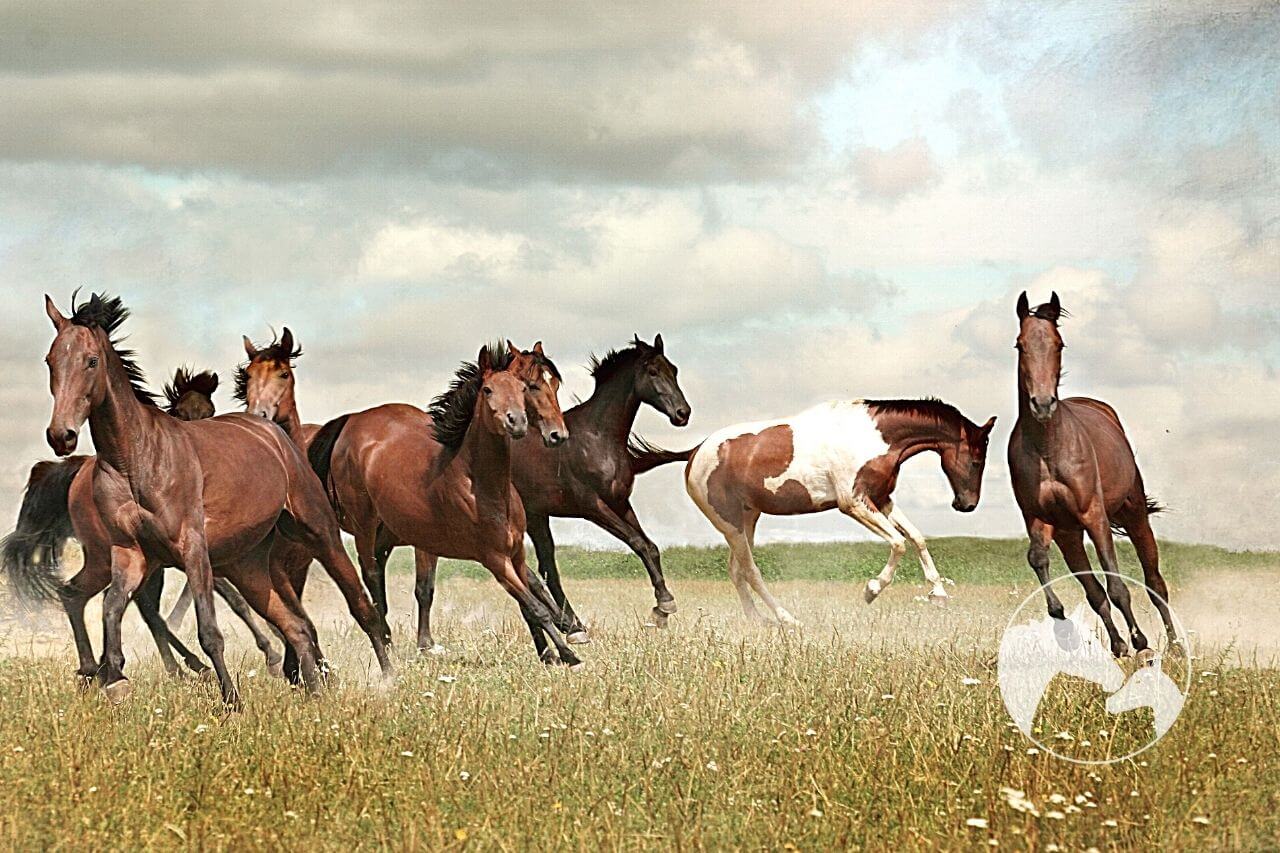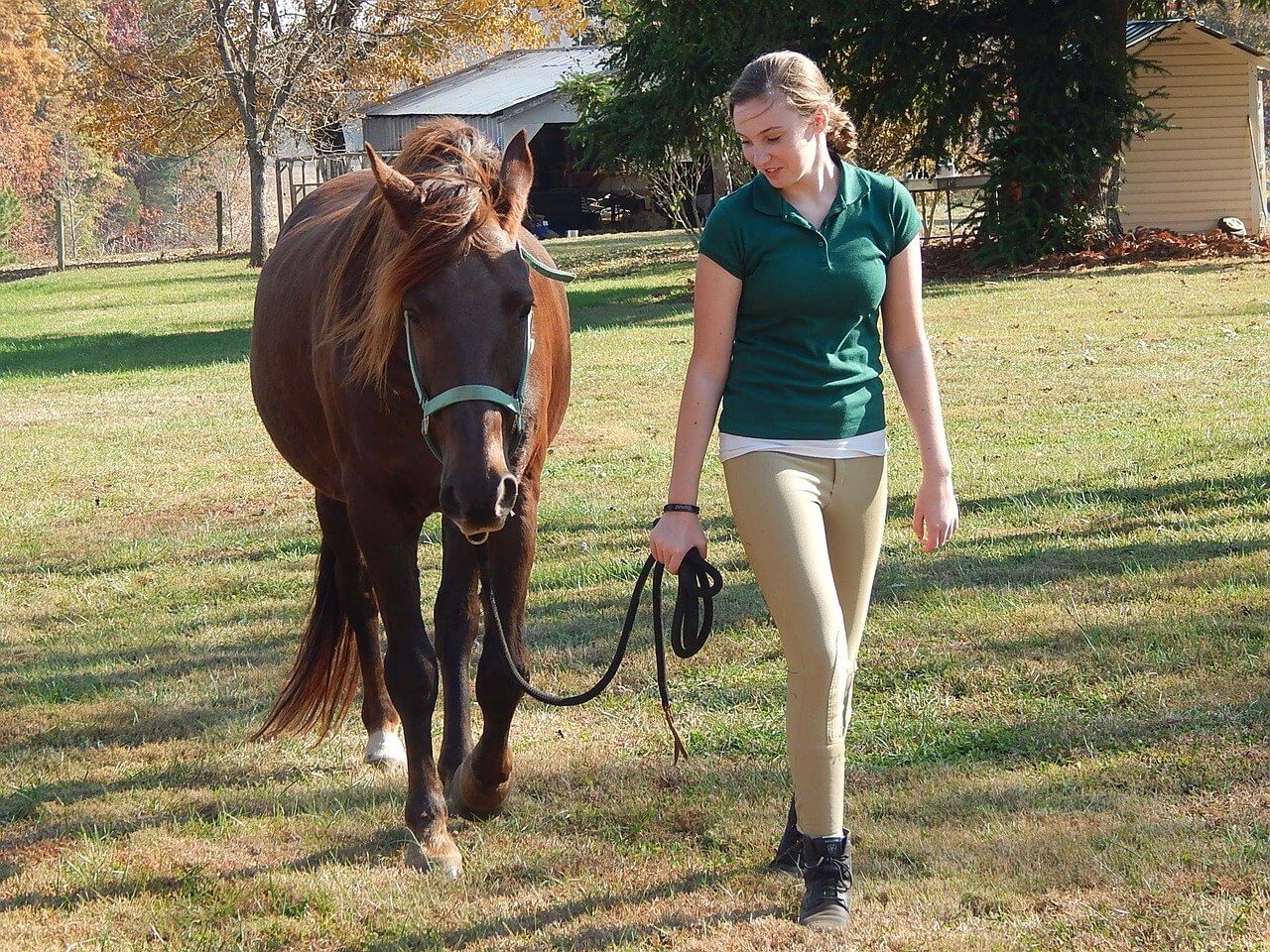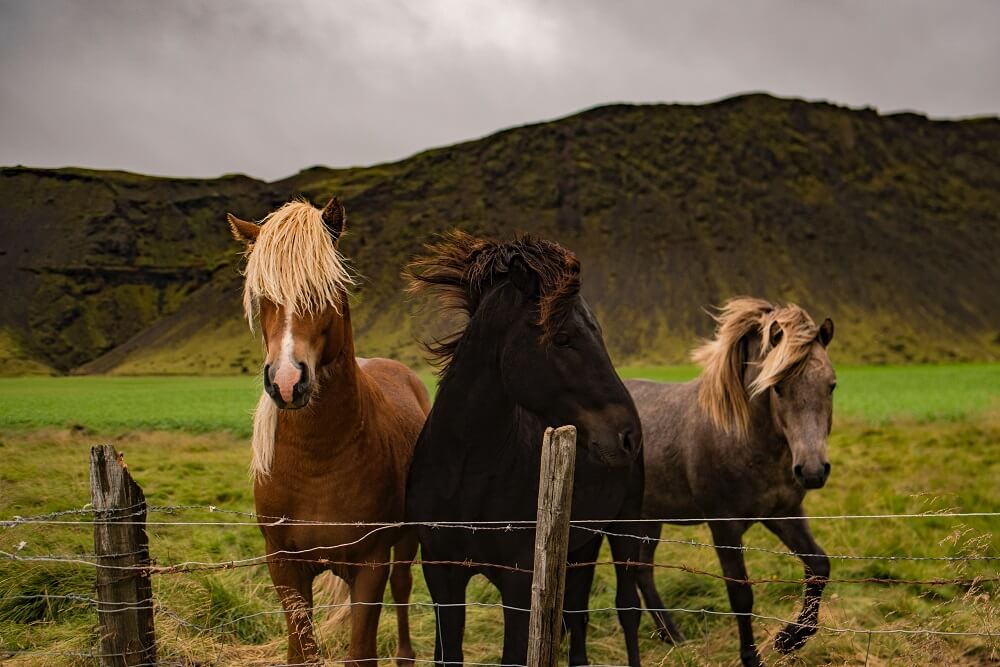Horse Kicking Other Horses During Feeding
Horses kicking other horses, other livestock, pets or people can be very dangerous. Some kicking is normal and not a cause for concern. Horses normally kick at flies, and they kick when playing.
Even the gentlest horse may kick when startled, but some horses pick up a bad habit of kicking aggressively at other horses and at people while being ridden or handled. This is definitely cause for concern. So how to stop a horse from kicking other horses?
In this article, we explore the reasons why horses kick and provide good advice to help prevent and deal with this problem. Read on to learn more.
What You'll Learn Today
- 1 Why Do Horses Kick?
- 2 Aggressive Kicking Needs Professional Help
- 3 How To Prevent Kicking Or Nip It In The Bud
- 4 Be Aware Of Your Surroundings And Pay Close Attention To Your Horse
- 4.1 How To Train A Horse Not To Kick (Fear Or Dominance)
- 5 Frequently Asked Questions
Why Do Horses Kick?

There are many reasons why horses kick. The first thing you must do when dealing with problem kicking is determine why your horse is kicking.
Here are some triggers to look for:
- Defense of food, foal or even of you if the horse feels another horse, animal or person is presenting a threat
- In response to being startled by the sudden approach of a person, horse or other animal from behind
- In response to unfamiliar equipment that has not been properly introduced (especially a cart or wagon)
- Out of sheer boredom if kept in a stall or small corral for extended periods of time
- In response to anticipated pain from improper saddling and girthing
- In response to a disliked animal (e.g. cat, dog, goat, pony, donkey)
- In response to improperly fitted, loose or dragging equipment
- Self defense against another aggressive horse or a predator
- To ward off unwanted advances by a stallion
- Unskillful handling (especially by a farrier)
- Romping and playing with a friend
- Pests such as ants in the pasture
- Prickly weeds in the pasture
- In response to crowding
- Pain in the belly (colic)
- Flies
Clearly, some of these reasons make sense. If your horse is kicking because you are hurting him when you tack him up, or you have decided to hitch him to a wagon or cart with no introduction, or he has been startled, crowded or threatened by another horse, animal or person, or he is bored out of his mind, the burden of change is on you.
Keep your horse healthy and safe. Don't sneak up on your horse. Prevent other people and animals from harassing him. Learn to introduce, apply and use equipment correctly.
If he has a strong dislike of a certain type of animal, don't take any chances. Keep him separate from that type of animal. Be sure your horse has ample room to move around and exercise.
Aggressive Kicking Needs Professional Help

Horses that kick occasionally for a logical reason are different than horses that kick out of meanness, disrespect or defiance.
A spoiled horse is one that has learned that it can avoid interaction and get its own way through aggression, including kicking.
This can be very hard (if not impossible) to deal with. A horse that greets you with aggression and/or kicks defiantly while you are handling and grooming him needs professional help from a good trainer.
You will need training too, to learn how to deal with this horse once his training is successfully completed.
Aggressive kicking is a bad habit, and it won't take much for a horse to slip back into this habit if all his handlers are not on the same page with the same, effective training and handling techniques.
How To Prevent Kicking Or Nip It In The Bud
First, avoid situations that will cause kicking. If your horse doesn't kick now, keep it that way by treating your horse with respect and providing stewardship that protects him from poor handling and upsetting, frightening, aggravating situations.
- When working around your horse, remember to veer wide around the hind legs unless you are grooming and need to be in close. Make sure that anyone who comes around knows to stay back, no matter how gentle your horse is. Don't let people walk up close to his rear.
- Work with your horse on responding to leg aids so that you can signal him to shift his rear end to one side or another when riding. This will enable you to redirect him and move him out of the way in the event another horse comes up too fast or moves in too close.
- If your horse does have a tendency to kick, you should tie a red ribbon onto his tail so that others will be warned. You might just do this anyway to prevent others from crowding you.
- If you are riding in a group, keep yourself and your horse positioned so that other horses aren't running up on his heels. If this becomes problematic, drop to the back of the group.
- Always call out to your horse when approaching him from behind so that he will know you are there.
- Always introduce new equipment gradually so that your horse can become accustomed to it.
- Don't allow service people (e.g. veterinarians, farriers, etc.) to mishandle your horse.
- Don't let children and small pets run under and around horses.
- Don't force your horse into crowded situations.
Horses who are handled fairly and humanely don't usually kick, but any horse who is startled, bullied, threatened, hurt or mishandled may start kicking.
Once this behavior is learned, it can quickly become bad habit. For this reason, you must always be vigilant and avoid situations that would trigger a kick response.
Be Aware Of Your Surroundings And Pay Close Attention To Your Horse

Determine what triggers kicking in your horse and eliminate triggers where possible. When riding, keep your eyes peeled so that you see his triggers before he does. If you see a situation brewing that may cause kicking, redirect your horse before he is triggered.
Watch your horse's body language as you handle him and as you ride. Pay attention to the direction of his gaze, the set of his ears and the way he moves and reacts to the surrounding area. If you are riding, you'll feel him tense or recoil in response to stimuli.
Learn to recognize signs that your horse is about to kick and make necessary adjustments (e.g. change direction, move away from the trigger, drop back in the group) to prevent that from happening.
With time and patience and careful stewardship, your horse may eventually lose the need to kick.
How To Train A Horse Not To Kick (Fear Or Dominance)
Frequently Asked Questions
1. Why do horses kick other horses?
Horses may kick other horses in self defense, or it may be a sign of dominance and part of establishing a pecking order. Horses may also kick at other horses to warn them to keep away from something or someone.
For example, a mare may kick to keep other horses away from her foal. A horse who is very bonded with its person may kick out of jealousy if another horse comes too close. A hungry horse may kick to keep other horses away from food or hay.
2. Why is my horse aggressive towards other horses?
Horses are aggressive toward other horses for many of the same reasons horses may kick other horses. Additionally, stallions will aggress toward each other when competing for a mare or for territory. Anxious or fearful horses may aggress toward others as a matter of defense.
3. How do you stop aggressive behavior in horses?
Understand that you cannot out-aggress a horse, and attempting to do so is childish, foolish and dangerous. If you have an aggressive horse, you should:
– Order a complete veterinary exam to rule out illness, pain and other treatable causes of aggression.
– Maintain a calm, sufficient environment. Avoid sudden changes and disruptions, and always make sure your horse has what he or she needs in terms of feed, hay, water and space to roam.
– Never overcrowd your horses. Too many horses in a small space will constantly aggress toward one another.
– Review cause and effect of aggressive behaviors in your horse and simply eliminate triggering events when it is reasonable and possible.
– Never reward aggressive behavior toward people. For example, if your horse acts out when you bring feed, don't reward aggressive behavior by providing the feed. Wait until your horse calms down, perks his ears and behaves pleasantly before providing feed.
– Don't feed treats by hand. This invites and teaches aggressive behavior.
4. How do you deal with a dominant horse?
To deal with a dominant horse, you must establish a pecking order with you at the top. You don't do this by attempting to dominate the horse. Instead, you set up a situation that clearly illustrates to the horse that you are in charge and that all good things come from you.
During training, a dominant horse should be separated from other horses and kept in its own stall and corral setting. Your goal will be for the horse to bond (aka: join up) with you.
This takes a great deal of commitment and consistency on your part. You must establish a regular daily schedule of feeding, socializing, grooming and handling and stick to it.
While your dominant horse should always have plenty of fresh, clean water, a salt lick and free access to good hay, access to feed must be conditional on positive interaction with you. You must have the patience to wait the horse out if he acts up when you show up at feeding time.
Don't reward bad behavior by giving feed to a bratty horse. Instead, wait until he comes to you and interacts with you positively before providing feed. This may mean several days without feed, but as long as he has hay and water, he'll be fine.
Note that feed should light and delivered in fairly small amounts. Feeding large amounts of "hot" feed can cause bad behavior.
Spend time with the horse. Sit quietly reading or engaging in some other calm pursuit. Talk with him, pet him, groom him, do ground work. You'll know you've turned the tables and have the upper hand when he consistently greets you with a cheerful nicker, comes to you and willingly participates in being haltered, groomed and doing ground work.
This method can take a long time, but the time, patience and effort it takes to become a partner with your horse is a valuable investment. A horse who is beaten into submission can turn on you at any moment. A horse who has joined up with you never will.
5. How do you fix stall aggressive behavior?
At its base, stall aggressive behavior is usually based in fear and territoriality. A stall aggressive horse is typically defending its space, feed and/or hay. To deal with this, begin with a veterinary exam to make sure your horse doesn't have a physical or dietary problem that may be causing the behavior.
Once you've ruled that out, deal with the aggressive behavior by determining exactly what triggers it and then figuring out how to eliminate those triggers and/or change your horse's response to them.
For example, if your horse acts aggressive when other horses or people walk by the stall, can you move your horse to an end stall with less passing traffic?
Make feeding grain conditional on good behavior. Just as when working with a dominant horse, be sure your stalled horse always has ample hay and fresh water so that an occasional skipped meal of grain won't be damaging. A horse who always has hay on hand is less likely to feel the need to defend it, so just having free access to hay may solve the aggression problem.
If your horse aggresses when you reach over the door to deliver feed, don't feed that way. Instead, make receiving feed dependent on your horse allowing you to halter him or her to leave the stall and receive feed in a different location. Make sure the stall gets cleaned while the horse is out.
Some advisors say that it's a good idea to work with aggressive horses in the stall, but this is too dangerous a proposition. You should never allow yourself to be cooped up in a small space with an aggressive horse. Instead, put more focus on taking the horse out, interacting more and joining up so that you can trust your horse's behavior in all circumstances.
Source: https://horsesandfoals.com/how-to-stop-a-horse-from-kicking-other-horses/